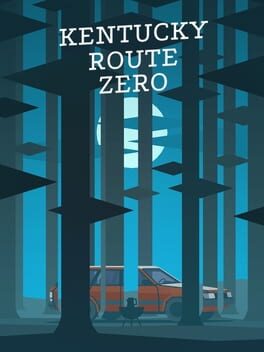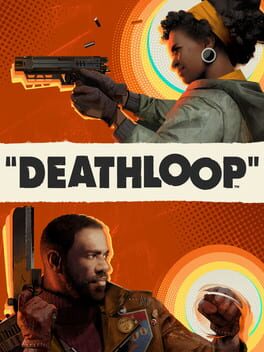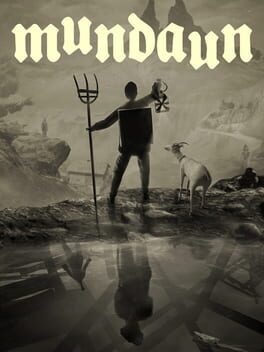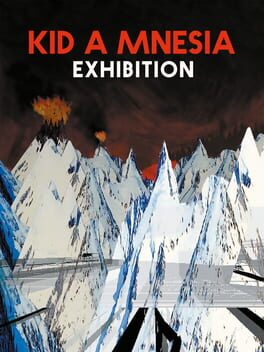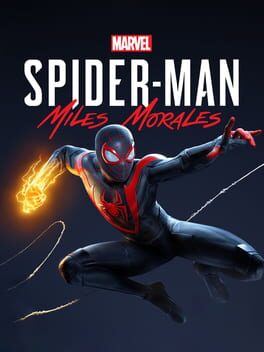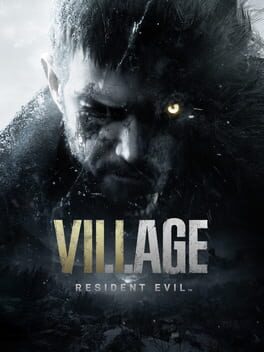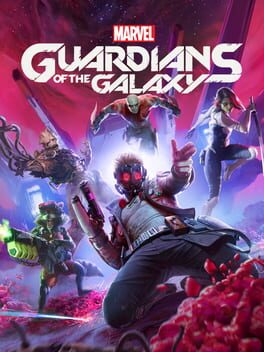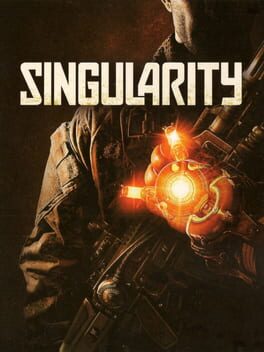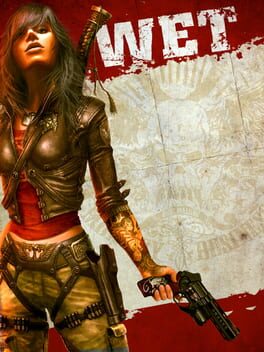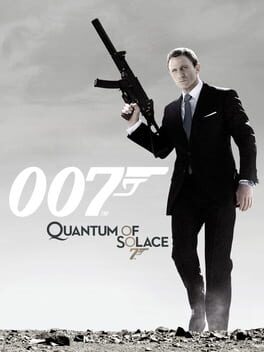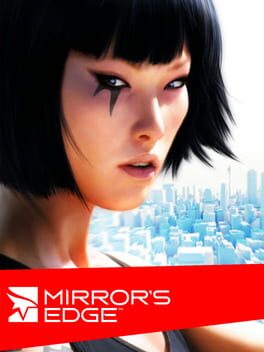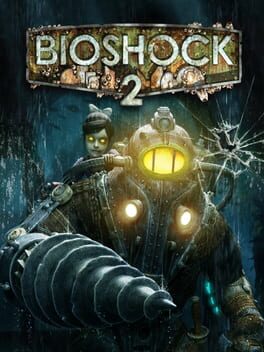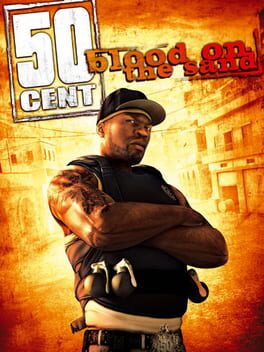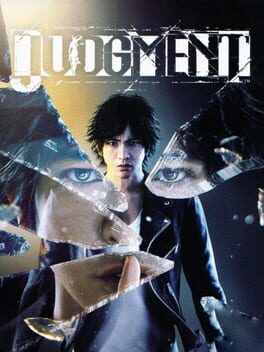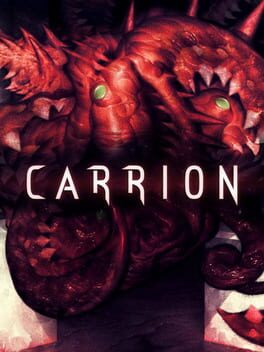zachmaycry
2013
If Townes van Zandt's songs were a game.
A swirl of beautiful, poetic, melancholic musings on the nature of relationships and community and loss and the cosmic absurdity of how any of us - and it - come together in the scattered lands this modern world has left behind in the dust.
I took three years off between Act IV and V and yet the end made me breakdown and cry for the first time in over four years.
A swirl of beautiful, poetic, melancholic musings on the nature of relationships and community and loss and the cosmic absurdity of how any of us - and it - come together in the scattered lands this modern world has left behind in the dust.
I took three years off between Act IV and V and yet the end made me breakdown and cry for the first time in over four years.
2021
a real gamers' game. a game for the gamers. made by gamers. maybe not gamey gamers. but definitely the sort of quote unquote "sophisticated" gamers. the gamers who played BioShock and Half-Life and have Deus Ex posters on their wall. there's nothing really wrong with these kinds of gamers, it's just all very mid, in my opinion. like the game of film geeks who think Edgar Wright invented action comedy or Guillermo del Toro invented horror.
it's a slickly crafted, lovingly shiny game that drips with a kind of contemporary sports car swag. it presents really well. all the art design is popping off the screen. it all screams "look at me!". and tonally, the game screams "love me!" too. like there's no friction here, not really. there's friction from the time loop stuff, but far less than in say a Souls game. gaining back your XP (or residuum) is not a huge time-wasting, anxiety-driving hassle. playing it with markers and hand-helpers on turns it into a very linear experience. which is not a knock for me, I love that shit. but still, it adds up. when you leave an area, you get a lil rewards screen where Colt does a little jig in the corner and it really made me wonder who exactly game was for.
some loose points:
the banter in this game is some Marvel/Deadpool esque nonsense. it's all very smarmy and self-aware but not clever or sharp or character revealing. julianna is snarky to the point of being non-existent as a character. Colt is so dumb he's almost charming. but the game has like zero intention of exploring who this man really is outside of lame comebacks and grumbled swearing. he's maybe the most interesting game dad in some time. he's far from the stoic brooding Geralt/Kratos/Joel archetype - instead he's a real genuine loser. but again the game nothing to really say about him or for him to say. he's just a surly player surrogate at the end of the day.
the game plays the way I wish Dishonored did. far smoother. less emphasis on stealth. you can basically play it like Doom in every level except the party mansion (which is less of an intricate deathtrap and more of a series of infinite AI, making it a real pain to be in). the powers are cool. all the high level guns look like Destiny weapons. it's a fun experience for about 5 or 6 hours until you kind of exhaust everything.
i wish there was more to this game than the pastiche art style and vague meta commentary on the endless bloodthirsty loop of video game violence from the point of view of underqualified gun man. every dollar and man hour clearly went into art and graphics. job well done. i wish the game had just anything to really say in the end because it seems like a waste. even if it was just a nice character story.
i feel like the previous generation of AAA gaming already turned hard away from dark and gritty stories and away from games that could really make the player feel a friction from playing them. and that the new generation kicks off with Deathloop only makes me worry we're in for even more snarky power-fantasy trips that cuddle players even more. aww well.
it's a slickly crafted, lovingly shiny game that drips with a kind of contemporary sports car swag. it presents really well. all the art design is popping off the screen. it all screams "look at me!". and tonally, the game screams "love me!" too. like there's no friction here, not really. there's friction from the time loop stuff, but far less than in say a Souls game. gaining back your XP (or residuum) is not a huge time-wasting, anxiety-driving hassle. playing it with markers and hand-helpers on turns it into a very linear experience. which is not a knock for me, I love that shit. but still, it adds up. when you leave an area, you get a lil rewards screen where Colt does a little jig in the corner and it really made me wonder who exactly game was for.
some loose points:
the banter in this game is some Marvel/Deadpool esque nonsense. it's all very smarmy and self-aware but not clever or sharp or character revealing. julianna is snarky to the point of being non-existent as a character. Colt is so dumb he's almost charming. but the game has like zero intention of exploring who this man really is outside of lame comebacks and grumbled swearing. he's maybe the most interesting game dad in some time. he's far from the stoic brooding Geralt/Kratos/Joel archetype - instead he's a real genuine loser. but again the game nothing to really say about him or for him to say. he's just a surly player surrogate at the end of the day.
the game plays the way I wish Dishonored did. far smoother. less emphasis on stealth. you can basically play it like Doom in every level except the party mansion (which is less of an intricate deathtrap and more of a series of infinite AI, making it a real pain to be in). the powers are cool. all the high level guns look like Destiny weapons. it's a fun experience for about 5 or 6 hours until you kind of exhaust everything.
i wish there was more to this game than the pastiche art style and vague meta commentary on the endless bloodthirsty loop of video game violence from the point of view of underqualified gun man. every dollar and man hour clearly went into art and graphics. job well done. i wish the game had just anything to really say in the end because it seems like a waste. even if it was just a nice character story.
i feel like the previous generation of AAA gaming already turned hard away from dark and gritty stories and away from games that could really make the player feel a friction from playing them. and that the new generation kicks off with Deathloop only makes me worry we're in for even more snarky power-fantasy trips that cuddle players even more. aww well.
2021
i love a game with a strong sense of geography, culture and history; a bit of a gameplay balance between friction and stark simplicity; and a compelling art style (in this case, one so befitting that it makes you ask what came first, "the story or the art?" because they're so symbiotic).
it's fitting this was the second last game I played of 2021 (last one before my PS5 and 'NeXt GeN gaming' arrived) because it sort of represents a culmination of every game philosophy I came to admire across the year. like if i could take every game I loved in 2021 and shove them into a ball of meat for lunch, it'd basically just be Mundaun.
it's fitting this was the second last game I played of 2021 (last one before my PS5 and 'NeXt GeN gaming' arrived) because it sort of represents a culmination of every game philosophy I came to admire across the year. like if i could take every game I loved in 2021 and shove them into a ball of meat for lunch, it'd basically just be Mundaun.
crushed under the weight of having to be a Resident Evil game and having to have herbs and a suitcase and a mansion area and a whole heap of gibberish the series calls lore. the beginning and end credits are presented as this very handsome, vaguely handcrafted Kubo-esque fairytale aesthetic that's screaming out to be its own game. but it's something that winds up looking like utter nonsense when bookending a standard AAA Resi Evil title.
still, if you can swallow the big pill, accept and get over all the typical series convictions, what's here is a plenty fun, goofy borderline camp RE game. no more zombies or plain old dumb charmless mold monsters. it's all werewolves and scythe wielding vampires. the atmosphere is right out of Bloodborne, if Bloodborne had a Call of Duty mode.
in my limited experience with RE (consisting of just 7 and the 2 and 3 remakes), this feels like the most honest the series has been about its typical action detour. it kind of starts at about a 7 on the action scale, gives you access to a gunsmith early, and it seems genuinely thrilled with your desire to shoot everything in its gooey face. at the climax it turns it up to 11 and dials directly straight in to Modern Warfare mode. i'd be kind upset if i were committed to the series and its horror posturing, but I just want to shoot scary monsters, honestly. so i had a ball. still can't help but be disappointed in the amount of dumb exposition the game dumps on you at the end tho and how it hinges on all these nonsense explanations for the supernatural. i wish the game could cut through all the Umbrella stuff and just be a nightmare game. there are sequences in this game very clearly inspired by PT, one by SOMA and Observer, seemingly. one where you fight a fish. and a penultimate boss fight that's like fighting the Truckasaurus. these don't need to be explained away. the game would be better served with a better sense of unreal dream logic. but oh well. i guess i'll have view the game through that lens myself.
there's a moment very early on in this game that i can only describe as the toxic masculine urge to carry on as if it's nothing wrong, and the timing of it is the most i laughed all year. i still think about it and chuckle. ✋
still, if you can swallow the big pill, accept and get over all the typical series convictions, what's here is a plenty fun, goofy borderline camp RE game. no more zombies or plain old dumb charmless mold monsters. it's all werewolves and scythe wielding vampires. the atmosphere is right out of Bloodborne, if Bloodborne had a Call of Duty mode.
in my limited experience with RE (consisting of just 7 and the 2 and 3 remakes), this feels like the most honest the series has been about its typical action detour. it kind of starts at about a 7 on the action scale, gives you access to a gunsmith early, and it seems genuinely thrilled with your desire to shoot everything in its gooey face. at the climax it turns it up to 11 and dials directly straight in to Modern Warfare mode. i'd be kind upset if i were committed to the series and its horror posturing, but I just want to shoot scary monsters, honestly. so i had a ball. still can't help but be disappointed in the amount of dumb exposition the game dumps on you at the end tho and how it hinges on all these nonsense explanations for the supernatural. i wish the game could cut through all the Umbrella stuff and just be a nightmare game. there are sequences in this game very clearly inspired by PT, one by SOMA and Observer, seemingly. one where you fight a fish. and a penultimate boss fight that's like fighting the Truckasaurus. these don't need to be explained away. the game would be better served with a better sense of unreal dream logic. but oh well. i guess i'll have view the game through that lens myself.
there's a moment very early on in this game that i can only describe as the toxic masculine urge to carry on as if it's nothing wrong, and the timing of it is the most i laughed all year. i still think about it and chuckle. ✋
Derivative of Uncharted, Mass Effect and Control. But derivative doesn't have to be a dirty word. Familiarity is comforting. This could have been a total disaster. In a weird way it feels like one of the rare AAA PS4-era games that was left alone by the publisher to be its own thing. In this day and age that means a game that doesn't take a lot of chances. Okay, fine. But I think like Jedi Fallen Order, and completely unlike Marvel's Avengers, this is a big, licensed Disney game that exudes some form of personality and spirit.
I enjoy that this game unlike the two Guardians of the Galaxy really plays into what desperate losers these guys are. It makes for the cliched moments when they come together as a team and bond feel more earned. I love the dialogue in this game. Not the actual dialogue itself, mind you. Just how much of it there is and how well it's scattered across the game. When you wander around as Peter to search for a collectible, Gamora or Rocket will ask what the fuck you're doing and if you're lost. Peter will say he's scouting. Small moments but they add up to a sense of place and character, and not in a blatantly self-referential meta way. The characters, at least for the first half, are almost always chatting, bantering, bickering, mostly over each other. It can feel like a Robert Altman film at times with just how much overlapping dialogue there is, or like an episode of Always Sunny.
I dig it. Unspectacular but in a world of corporate art it's nice to get a single player game that's primarily story centric and linear and just left to be its own thing. I'll take it as a small miracle.
I enjoy that this game unlike the two Guardians of the Galaxy really plays into what desperate losers these guys are. It makes for the cliched moments when they come together as a team and bond feel more earned. I love the dialogue in this game. Not the actual dialogue itself, mind you. Just how much of it there is and how well it's scattered across the game. When you wander around as Peter to search for a collectible, Gamora or Rocket will ask what the fuck you're doing and if you're lost. Peter will say he's scouting. Small moments but they add up to a sense of place and character, and not in a blatantly self-referential meta way. The characters, at least for the first half, are almost always chatting, bantering, bickering, mostly over each other. It can feel like a Robert Altman film at times with just how much overlapping dialogue there is, or like an episode of Always Sunny.
I dig it. Unspectacular but in a world of corporate art it's nice to get a single player game that's primarily story centric and linear and just left to be its own thing. I'll take it as a small miracle.
2010
i thought with the soviet backdrop on top of the time travel gimmick that this would be much more politically, historically and thematically interesting. but it's threadbare; it's a nothing game. it has the makeup of a modern warfare/killzone shooter clone with some half-life type attempt at physics but the shooting lacks pizazz and the puzzles feel half-assed. the time travel stuff also feels years ahead of its time. i don't know what kind of game they wanted to make original but i am picturing a design document that looks like a pristine construction while the finished product looks like homer simpson's grill with the umbrella sticking out of it.
2009
if you absolutely, positively need to kill a bunch of polygonal goons in order to kill an hour before work because you have anxiety and a crippling addiction to video game shooters calms you, you probably can't do much worse than this.
it's sort of bootleg Uncharted. which is weird, because Uncharted is bootleg James Bond in game form. this is both a very generic and cheap game but it is nice and functional as a shooter with sharp AI. it replicates set pieces from Casino Royale and Quantum of Solace... i'm not adding "well". it doesn't replicate anything well. but it does replicate some of the best of what those two Craig Bond movies had to offer. narratively it is trash. no subtitles so I had no idea why it was flashing between the two films. i just rewatched Casino Royale too, it didn't raise my appreciatio for that movie, but it did make me wish I'd just rewatched Quantum of Solace instead. it made me like just a little more. made me wish I was replaying Max Payne 3 as well, or Rogue Warrior. could have just replayed rogue warrior
it's sort of bootleg Uncharted. which is weird, because Uncharted is bootleg James Bond in game form. this is both a very generic and cheap game but it is nice and functional as a shooter with sharp AI. it replicates set pieces from Casino Royale and Quantum of Solace... i'm not adding "well". it doesn't replicate anything well. but it does replicate some of the best of what those two Craig Bond movies had to offer. narratively it is trash. no subtitles so I had no idea why it was flashing between the two films. i just rewatched Casino Royale too, it didn't raise my appreciatio for that movie, but it did make me wish I'd just rewatched Quantum of Solace instead. it made me like just a little more. made me wish I was replaying Max Payne 3 as well, or Rogue Warrior. could have just replayed rogue warrior
2008
feels like the rough draft for a failed revolution.
the platforming and sign-posting is smooth for the most part. the rough edges around the parkour gameplay that are there feel like they were intended to be fixed in forthcoming sequels that unfortunately never eventuated.
the story feels glued on, or in this case, crudely animated and inserted in. the game didn't really need a plot or heavy characterisation. what's left feels like a half-thought idea scribbled on a napkin.
and that's the frustrating problem with mirror's edge. everything feels half thought out; half fleshed out. or like every idea was walked back to make it more marketable in a post Modern Warfare shooter market. nothing other than parkour movement and maybe the bold primary colour palette feels particularly cared for or loved and laboured over.
a lot of mirror's edge leaves me saying "what if?". what if this game had a more fleshed out lore or setting or characters. what if had a more engaging plot. what if the combat were a little smoother to match your movements, instead of this precision, time-based crap. what if there no guns or shooting. faith doesn't feel like a murderer. the guns have no hud elements; no ammo counts. they are designed to encumber your movement and your ledge-grabbing. there's clearly some conscious element at play regarding gun violence and typical video game combat. what if i didn't make this game, or someone like me, because everything about reminds me of every poorly thought idea i've had, and the lack of connective tissue between concept and execution made me sit up and point at my tv several times like the rick dalton once upon a time in hollywood meme, like, "hey i recognise this kind of creative failure!"
anyway. the colours are cool, and when you find the game's flow state (which is often less than you'd like) and moving and jumping without flaw, the game shines as bright as any action game i've played. it's a shame it's a formula that wasn't sanded down to perfection and we never got the holy grail (or Casino Royale) of free-running games. maybe one day. because this a great template for a more pacifist form of video game action/violence. instead now we get a battlefield every few years.
the platforming and sign-posting is smooth for the most part. the rough edges around the parkour gameplay that are there feel like they were intended to be fixed in forthcoming sequels that unfortunately never eventuated.
the story feels glued on, or in this case, crudely animated and inserted in. the game didn't really need a plot or heavy characterisation. what's left feels like a half-thought idea scribbled on a napkin.
and that's the frustrating problem with mirror's edge. everything feels half thought out; half fleshed out. or like every idea was walked back to make it more marketable in a post Modern Warfare shooter market. nothing other than parkour movement and maybe the bold primary colour palette feels particularly cared for or loved and laboured over.
a lot of mirror's edge leaves me saying "what if?". what if this game had a more fleshed out lore or setting or characters. what if had a more engaging plot. what if the combat were a little smoother to match your movements, instead of this precision, time-based crap. what if there no guns or shooting. faith doesn't feel like a murderer. the guns have no hud elements; no ammo counts. they are designed to encumber your movement and your ledge-grabbing. there's clearly some conscious element at play regarding gun violence and typical video game combat. what if i didn't make this game, or someone like me, because everything about reminds me of every poorly thought idea i've had, and the lack of connective tissue between concept and execution made me sit up and point at my tv several times like the rick dalton once upon a time in hollywood meme, like, "hey i recognise this kind of creative failure!"
anyway. the colours are cool, and when you find the game's flow state (which is often less than you'd like) and moving and jumping without flaw, the game shines as bright as any action game i've played. it's a shame it's a formula that wasn't sanded down to perfection and we never got the holy grail (or Casino Royale) of free-running games. maybe one day. because this a great template for a more pacifist form of video game action/violence. instead now we get a battlefield every few years.
2010
less of a sequel and more of the second side of a double-album. continues down many of the same paths as side 1 but quickly descends into murkier, uglier, dirtier territory. like, literally. i think there's twice as many corpses, graffiti and trash/debris scattered across Rapture this game. and Rapture - or the fallen remnants of what was Rapture - are like catnip to me. playing this a few weeks after 1 and i felt like i was home.
random note:
- i guess i find collectivism and sofia lamb more fascinating than andrew ryan and the objectivism stuff from 1, even though i am still sure this game has a very rudimentary of those concepts as i do (i say this because bioshock loves giving the villains ideologies and making the player character a voiceless, thoughtless, strictly laborious tool which makes the game's politics feel more theoretical and idealistic, like the game writers arrived at their point before working on the game and thus everything feels pre-determined and less shaped by reality. the feeling is like you're being giving a long lecture and when you want to come in with your rebuttal the credits roll).
- i like that you play as a literal big daddy. it's the third game, infinite, that often comes up in conversation of dad games, but 2 clearly beat it to the punch. i kind of like eleanor more than elizabeth. i like the part of the game where you see the world through her little sister'd out mind. i like the concept of the big sisters, a concept that feels like it could be better explored (maybe they were in infinite and i blocked it out). i am not sure what this game wants to say about fatherhood other than reinforcing the idea of father's as "protectors" but i do like that the ending is determined by eleanor reacting to your choices (which is very "i learned it from you!" but i like how that could be thrown in your face if you're a dickhead dad).
- parts of this game felt very SOMA.
- game has great water.
- i still think this series is potentially unmatched today re: art direction.
- this made me like 1 less (at first i thought maybe i liked 2 more but it's more than 2 makes 1 seem redundant).
random note:
- i guess i find collectivism and sofia lamb more fascinating than andrew ryan and the objectivism stuff from 1, even though i am still sure this game has a very rudimentary of those concepts as i do (i say this because bioshock loves giving the villains ideologies and making the player character a voiceless, thoughtless, strictly laborious tool which makes the game's politics feel more theoretical and idealistic, like the game writers arrived at their point before working on the game and thus everything feels pre-determined and less shaped by reality. the feeling is like you're being giving a long lecture and when you want to come in with your rebuttal the credits roll).
- i like that you play as a literal big daddy. it's the third game, infinite, that often comes up in conversation of dad games, but 2 clearly beat it to the punch. i kind of like eleanor more than elizabeth. i like the part of the game where you see the world through her little sister'd out mind. i like the concept of the big sisters, a concept that feels like it could be better explored (maybe they were in infinite and i blocked it out). i am not sure what this game wants to say about fatherhood other than reinforcing the idea of father's as "protectors" but i do like that the ending is determined by eleanor reacting to your choices (which is very "i learned it from you!" but i like how that could be thrown in your face if you're a dickhead dad).
- parts of this game felt very SOMA.
- game has great water.
- i still think this series is potentially unmatched today re: art direction.
- this made me like 1 less (at first i thought maybe i liked 2 more but it's more than 2 makes 1 seem redundant).
the sincere hyper stylisation makes for a sharper criticism of the ps3/360 era middle-eastern shooter than Spec Ops the Line's preachiness. additionally, blood on the sand's maximalism serves as a send up of its combat inspiration, Gears of War, by simply not being as dreary to look at. it also sort of feels like the underside of the rock that is Uncharted. Uncharted, a series that presents itself as a sparking gem to everyone who passes by, but if you stopped to lift it over, you'd see an ugliness that is basically blood in the sand.
this is the kind of game they don't make any more. licensed AAA shooting games starring rappers, for one. this kind of trashy hyper stylisation and linear gaminess is maybe really only seen in Devil May Cry and Bayonetta today too. it kind of reminded me of famed music video director, Hype Williams' lone feature film, Belly. I am waiting to see contemporary cinema and hip hop culture to converge in such a spectacular fashion again but it seems like it promises never to be. blood on the sand, likewise, feels like a once a lifetime piece of culture.
this is the kind of game they don't make any more. licensed AAA shooting games starring rappers, for one. this kind of trashy hyper stylisation and linear gaminess is maybe really only seen in Devil May Cry and Bayonetta today too. it kind of reminded me of famed music video director, Hype Williams' lone feature film, Belly. I am waiting to see contemporary cinema and hip hop culture to converge in such a spectacular fashion again but it seems like it promises never to be. blood on the sand, likewise, feels like a once a lifetime piece of culture.
2018
Is good writing too high of an ambition?
I was listening to Jacob Geller and Blake Hester's Something Rotten podcast, where the two men discuss Max Payne 3 and the two Kane & Lynch games. Geller brought up that he heard Hester share a hot take: that the best video game stories are only, barely, on par with mediocre movies and TV.
My response to this take evolved through three stages;
1) "omg no way! I totally teared up playing Red Dead Redemption and The Last of Us!"
2) "hmm, yeah. You're write. Games suck at writing. It's a special skill that game developers aren't necessarily equipped for. To paraphrase the oft-quoted John Carmack, story in games is like story in porn. Most games are not developed from a script first, but with a series of system and mechanic documents in place first with the story and writing poured on after like a cheap, cold tin of tomato sauce over a hot plate of pasta (at best, maybe it's more like a little garnish)."
3) "you know what, who cares? Most movies and TV have mediocre writing. Green Book won for best Original Screenplay at the 2019 Oscars. The Avengers movies made like a billion dollars. Writing isn't easy for anyone, no matter the medium. Not to mention, film, to me, is like a sensory artform. Story is cool but movies aren't literature. And even literature can appeal on prose over narrative and "character development". But cinema to me is all light and montage. My favourite movie is Michael Mann's Miami Vice, and I can't explain why because I've never really been able to properly articulate the feeling that movie's digital grain gives me. It is quite literally "the vibe". The work of filmmakers like Paul WS Anderson, Edward Yang and Pedro Costa excite me, too, purely on a compositional level. Late era Tony Scott's avant garde editing style isn't something I am equipped to talk about, all I know is when I see it I go gaga. Similarly, the collaborative work of Martin Scorsese and editor Thelma Schoonmaker just tickles a part of my brain - and I could spend 1000 years still fail to explain why and how the rhythms of their cuts dazzle me.
Anyway, my point is, I don't come to film for writing, so why should I come to games for it? I ask myself this because good game writing is still, probably, what I consider the biggest hook. Or I consider character writing, specifically, a big hook. I need someone and something to care about to pull me through to a game's conclusion... at least most of the time. I certainly don't come to games for gameplay. I mean, I do, but not really. I don't really come to games for complex gameplay, at least. I don't play games to master systems. I do return to shooters and sword-swinging adventures a lot but that's partly because, with brawlers aside, that's 2/3s of combat in combat-centric games.
What I am beginning to think, however, is maybe I come to games for the vibes; for the same visual sensory appeal I get from movies. I come to games for - oh wow, I don't want to say it... - the digital spaces. The way games create architecture and worlds and allow you the freedom to explore rich, detailed spaces is so exciting. I don't want to live in these worlds, but I want to occupy them the same way I want to occupy the Baltimore depicted in The Wire or the west from Blood Meridian. I love reading because I love when my imagination works, filling in all the visual details around the worlds. When I read Raymond Chandler and I picture 30s/40s California; when I read The Wheel of Time and picture the endless Aiel Waste (wow, I read so little, these aren't great references lol). I love how games can even better render those details, and then let you literally, physically explore them. In a way, games are living dreams.
I've lost track of a coherent thesis here.
To swing it to Judgment. I don't know that Judgment is well written. It hinges on a lot of cliches and rote twists. The dialogue isn't particularly remarkable. Characters are complex only in the sense that they're all morally grey, and the ones who aren't are just good people. Its whole deal can be summed up as "isn't the truth really cool?" But, man, as a vibe, I dug it a lot. I loved noir twinges. The smoky, cramped, humid detective office. The stale, sterile courtrooms and hospital hallways. The busy, glittery Kamurocho streets. I love the soap opera plot. I like a good mystery, and there aren't many (non-visual novel) games wholly dedicated to unravelling a mystery. At the end of the day, it is less Raymond Chandler and more daytime court TV, but I was pretty damned hooked.
A lot of what Judgment exemplifies best is what I do consider game writing though. And it's not the execution I appreciate but the set up. I love when game presents the player with a fully fleshed out, lived-in universe, especially when that universe has a footing in the real world, depicting real people/cultures. A love when a game presents you with a character who has their own thoughts and feelings and history that exists beyond the player. Judgment is maybe the best example of what I think of when I hear the term "immersive sim". Not just because the game is maybe the best execution of one of the immersive sim genre's grandfathers, Warren Spector's idea for the "one perfect block" concept. Judgment isn't exactly a living sim. And it's not an open world game per se, so it doesn't really even matter. sure, you can't interact with everyone and everything. But you walk the streets of Kamurocho and you get a real sense of place and atmosphere and life that exists independent of your actions. You can walk into enough interiors, and around plenty of pedestrians to feel like you're in a real city. It's small enough, too, to memorise after 10-ish hours of playtime.
I think in contrast, too much of the actual immersive sim genre is dedicated to bringing to life unreal places to life, not reality and of its sober doldrums. It's a genre dedicated to placing very specific characters on dedicated paths purely to serve as obstacles for the player. Every nook and cranny is explorable but only because it wants you to collect things, not take in and truly occupy those spaces. It presents you with alternate paths with both violent and stealthy, pacifist routes ahead because it wants you to feel catered to, because it values choice, even though it cannot admit choice in video games is always a carefully, constructed lie/illusion. It's a genre with its head in the clouds, and you hoisted up on its shoulders in effort to make you feel important.
I don't know how I got here but I think a really "immersive" games is one that places you in a real location, with real history, and most importantly in the shoes of a real, pre-spec'd character - one, who again, let's say has their own character sheet and could - at least, and most certainly - in the game world exist independently of the player. I think of games like Disco Elysium, the little bit of The Witcher 2 I played hours before Judgment, Red Dead Redemption II (and Red Dead Redemption). For me, when I want to roleplay, I want to be somebody else, and not in the Ready Player One/Comic-Con cosplay way where I am me but with wackier hair and nicer clothes, or one where I am, like, Godzilla. I want to be a whole person. To me, that's immersion - when a game can successfully transfer that feeling over to you and make you feel like another person for 10/20/40+ hours. Judgment does that, in my opinion. Takayuki Yagami isn't some amazingly written individual, but the game goes to lengths to give him a history and a personality and reasons to care about the people around him. I don't care that it's not as good as The Sopranos but it's as good as a show like Justified or Bosch - neither of which I think of as mediocre (actually two of my all-time fave shows) - and I think that's a safe, reasonable ambition most character-action AAA games can aim for. The best games can be as well-written as Bosch... if they want to be. Not that they really have to be.
Maybe I am overrating this but the experience reminded me a lot of what I got out of Final Fantasy VII Remake and Metro Exodus. That's starting to become the baseline for what I consider a good, modern game, I suppose.
I was listening to Jacob Geller and Blake Hester's Something Rotten podcast, where the two men discuss Max Payne 3 and the two Kane & Lynch games. Geller brought up that he heard Hester share a hot take: that the best video game stories are only, barely, on par with mediocre movies and TV.
My response to this take evolved through three stages;
1) "omg no way! I totally teared up playing Red Dead Redemption and The Last of Us!"
2) "hmm, yeah. You're write. Games suck at writing. It's a special skill that game developers aren't necessarily equipped for. To paraphrase the oft-quoted John Carmack, story in games is like story in porn. Most games are not developed from a script first, but with a series of system and mechanic documents in place first with the story and writing poured on after like a cheap, cold tin of tomato sauce over a hot plate of pasta (at best, maybe it's more like a little garnish)."
3) "you know what, who cares? Most movies and TV have mediocre writing. Green Book won for best Original Screenplay at the 2019 Oscars. The Avengers movies made like a billion dollars. Writing isn't easy for anyone, no matter the medium. Not to mention, film, to me, is like a sensory artform. Story is cool but movies aren't literature. And even literature can appeal on prose over narrative and "character development". But cinema to me is all light and montage. My favourite movie is Michael Mann's Miami Vice, and I can't explain why because I've never really been able to properly articulate the feeling that movie's digital grain gives me. It is quite literally "the vibe". The work of filmmakers like Paul WS Anderson, Edward Yang and Pedro Costa excite me, too, purely on a compositional level. Late era Tony Scott's avant garde editing style isn't something I am equipped to talk about, all I know is when I see it I go gaga. Similarly, the collaborative work of Martin Scorsese and editor Thelma Schoonmaker just tickles a part of my brain - and I could spend 1000 years still fail to explain why and how the rhythms of their cuts dazzle me.
Anyway, my point is, I don't come to film for writing, so why should I come to games for it? I ask myself this because good game writing is still, probably, what I consider the biggest hook. Or I consider character writing, specifically, a big hook. I need someone and something to care about to pull me through to a game's conclusion... at least most of the time. I certainly don't come to games for gameplay. I mean, I do, but not really. I don't really come to games for complex gameplay, at least. I don't play games to master systems. I do return to shooters and sword-swinging adventures a lot but that's partly because, with brawlers aside, that's 2/3s of combat in combat-centric games.
What I am beginning to think, however, is maybe I come to games for the vibes; for the same visual sensory appeal I get from movies. I come to games for - oh wow, I don't want to say it... - the digital spaces. The way games create architecture and worlds and allow you the freedom to explore rich, detailed spaces is so exciting. I don't want to live in these worlds, but I want to occupy them the same way I want to occupy the Baltimore depicted in The Wire or the west from Blood Meridian. I love reading because I love when my imagination works, filling in all the visual details around the worlds. When I read Raymond Chandler and I picture 30s/40s California; when I read The Wheel of Time and picture the endless Aiel Waste (wow, I read so little, these aren't great references lol). I love how games can even better render those details, and then let you literally, physically explore them. In a way, games are living dreams.
I've lost track of a coherent thesis here.
To swing it to Judgment. I don't know that Judgment is well written. It hinges on a lot of cliches and rote twists. The dialogue isn't particularly remarkable. Characters are complex only in the sense that they're all morally grey, and the ones who aren't are just good people. Its whole deal can be summed up as "isn't the truth really cool?" But, man, as a vibe, I dug it a lot. I loved noir twinges. The smoky, cramped, humid detective office. The stale, sterile courtrooms and hospital hallways. The busy, glittery Kamurocho streets. I love the soap opera plot. I like a good mystery, and there aren't many (non-visual novel) games wholly dedicated to unravelling a mystery. At the end of the day, it is less Raymond Chandler and more daytime court TV, but I was pretty damned hooked.
A lot of what Judgment exemplifies best is what I do consider game writing though. And it's not the execution I appreciate but the set up. I love when game presents the player with a fully fleshed out, lived-in universe, especially when that universe has a footing in the real world, depicting real people/cultures. A love when a game presents you with a character who has their own thoughts and feelings and history that exists beyond the player. Judgment is maybe the best example of what I think of when I hear the term "immersive sim". Not just because the game is maybe the best execution of one of the immersive sim genre's grandfathers, Warren Spector's idea for the "one perfect block" concept. Judgment isn't exactly a living sim. And it's not an open world game per se, so it doesn't really even matter. sure, you can't interact with everyone and everything. But you walk the streets of Kamurocho and you get a real sense of place and atmosphere and life that exists independent of your actions. You can walk into enough interiors, and around plenty of pedestrians to feel like you're in a real city. It's small enough, too, to memorise after 10-ish hours of playtime.
I think in contrast, too much of the actual immersive sim genre is dedicated to bringing to life unreal places to life, not reality and of its sober doldrums. It's a genre dedicated to placing very specific characters on dedicated paths purely to serve as obstacles for the player. Every nook and cranny is explorable but only because it wants you to collect things, not take in and truly occupy those spaces. It presents you with alternate paths with both violent and stealthy, pacifist routes ahead because it wants you to feel catered to, because it values choice, even though it cannot admit choice in video games is always a carefully, constructed lie/illusion. It's a genre with its head in the clouds, and you hoisted up on its shoulders in effort to make you feel important.
I don't know how I got here but I think a really "immersive" games is one that places you in a real location, with real history, and most importantly in the shoes of a real, pre-spec'd character - one, who again, let's say has their own character sheet and could - at least, and most certainly - in the game world exist independently of the player. I think of games like Disco Elysium, the little bit of The Witcher 2 I played hours before Judgment, Red Dead Redemption II (and Red Dead Redemption). For me, when I want to roleplay, I want to be somebody else, and not in the Ready Player One/Comic-Con cosplay way where I am me but with wackier hair and nicer clothes, or one where I am, like, Godzilla. I want to be a whole person. To me, that's immersion - when a game can successfully transfer that feeling over to you and make you feel like another person for 10/20/40+ hours. Judgment does that, in my opinion. Takayuki Yagami isn't some amazingly written individual, but the game goes to lengths to give him a history and a personality and reasons to care about the people around him. I don't care that it's not as good as The Sopranos but it's as good as a show like Justified or Bosch - neither of which I think of as mediocre (actually two of my all-time fave shows) - and I think that's a safe, reasonable ambition most character-action AAA games can aim for. The best games can be as well-written as Bosch... if they want to be. Not that they really have to be.
Maybe I am overrating this but the experience reminded me a lot of what I got out of Final Fantasy VII Remake and Metro Exodus. That's starting to become the baseline for what I consider a good, modern game, I suppose.
2020
Very linear. Very basic. Lot of flicking of switching. Does not stretch your mind or anything at all.
But. As a vibe, man, slithering around as a giant Thing-like monster just chomping on screaming, fleeing human beings is extremely satisfying. There's nothing to the game more than that. I'm feeling like shit, so, honestly, the power fantasy of being the bad guy who is not just free but encouraged to devour people really hit the spot. It's kind of like an extended version of the end of a certain 2016 triple-I indie game. Carrion made me appreciate that game way more. But also I'd rather play this because it's all desert.
But. As a vibe, man, slithering around as a giant Thing-like monster just chomping on screaming, fleeing human beings is extremely satisfying. There's nothing to the game more than that. I'm feeling like shit, so, honestly, the power fantasy of being the bad guy who is not just free but encouraged to devour people really hit the spot. It's kind of like an extended version of the end of a certain 2016 triple-I indie game. Carrion made me appreciate that game way more. But also I'd rather play this because it's all desert.
